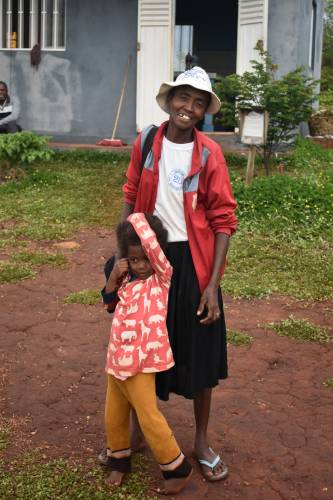by Dan Turk and Rolland Razafiarison | Fruits, Vegetables, and Environmental Education Program (FVEE) of the Church of Jesus Christ in Madagascar (FJKM)

Pastor Eric Rakotoarijaona receiving grafted mango trees at the FJKM church at Betroka. Photo by Dan Turk.
Many people consider mangos to be among the world’s best tasting fruits. Not only are they delicious, but they can also be tools for fighting hunger and poverty.
In Madagascar about ¾ of the population are subsistence farmers. Most struggle to grow enough food to eat and have enough left over to sell to pay school fees and purchase clothes, medicines, and other necessities. If people could focus on growing higher value crops, such as fruits, they could potentially increase their food security and income considerably. But there are many obstacles, such as the primary need to produce food to eat, the uncertainty and risk involved in starting something new, and the lack of available skills and inputs needed for new endeavors that make breaking the cycle of poverty hard for subsistence farmers.
One challenge with growing fruit trees is the time that it takes new trees to begin bearing good fruit crops (4 to 7 years or more). Another is the availability and cost of quality fruit trees. A third is the reality that growing fruits does not fit well in the 2- to 3-year time frame of most development projects.
In Madagascar, there is little assistance available to help subsistence farmers grow fruit trees since the impact can’t be measured immediately. This is why churches with a long-term Matthew 25 commitment to fighting poverty and building community relations are well suited to engage in this work.
Why mangos? Mangos produce good crops of fruits in areas with a long dry season and relatively infertile soils. They have great potential in over half of Madagascar (other than the Central Highlands, the narrow rainforest zone in the East and the very far South where there is not enough rainfall).
Growing selected mango varieties that were introduced to Madagascar in 1964 has proven quite successful in the Mahajanga area of Northern Madagascar, but these varieties and the grafting techniques needed to propagate them have not spread beyond the Mahajanga area.
We work with the Fruits, Vegetables, and Environmental Education Program (FVEE) of the Church of Jesus Christ in Madagascar (FJKM) which is PC(USA)’s partner denomination in Madagascar. The FVEE has developed a fruit program over years that has involved assembling an extensive collection of top-quality fruit tree varieties, developing plant propagation skills, setting up permanent fruit nurseries including one at Ankaramena which will provide grafted mango trees for Southern Madagascar, and learning how to help community members work together to solve their pressing needs. Since 2020, the Presbyterian Hunger Program (PHP) has partnered with the FVEE to help low-income farmers grow and propagate fruit trees, especially mangos, to get on a path out of poverty.
Tsarahonenana is a town about 5 hours northwest of Antananarivo that is right on the road where trucks go through on their 12-hour trip from Mahajanga to take quality mangos to sell in Antananarivo. In 2021, 50 people from Tsarahonenana got trained at the FJKM fruit center at Mahatsinjo where they learned how to graft and received 6 fruit trees including 3 grafted mango trees. After that first training, Ms. Martine Rasoarinoro became the volunteer community organizer for Tsarahonenana’s mango growers. Though she was not among the first group who got trained, Ms. Rasoarinoro learned to graft from her husband who did receive training. She later said, “I have done a lot, but if I were to get trained, I could do so much more.” That opportunity came in December 2022, when 57 more people from Tsarahonenana received training. Again, all the trainees took home fruit trees and skills needed to graft them so as to eventually produce as many grafted trees as they would like to plant. Now that some of the first trees planted have started to produce mangos of good quality and people are beginning to produce grafted trees, the opportunity to get out of poverty is becoming clear.
In 2022, the FVEE trained 40 members of the Betela FJKM church at Betroka in Southern Madagascar. That church has adopted mango growing as part of its mission. The pastor, Eric Rakotoarijaona, is providing important leadership in this effort. In a video the church produced, he says “The FVEE gave the FJKM church at Betroka 21 mango varieties. They have already produced fruits. We have eaten them and found them to be sweet and really good. Therefore, the church is enthusiastic about propagating them and spreading those varieties. Thanks to the FVEE and those who support it because this project is very important for the church. To God be the glory.”
The FJKM church as a denomination is committed to fighting hunger and poverty and recognizes that helping subsistence farmers grow good mango varieties is a great way to do this. The FVEE and the FJKM appreciate greatly PHP’s support in these efforts.
The work of the Presbyterian Hunger Program is possible thanks to your gifts to One Great Hour of Sharing.
